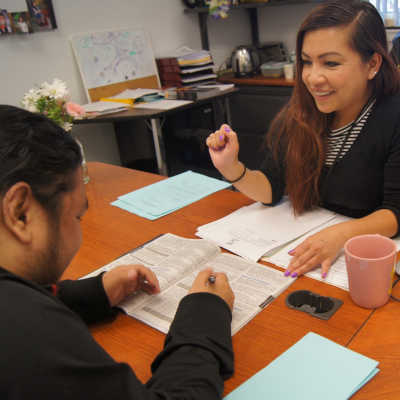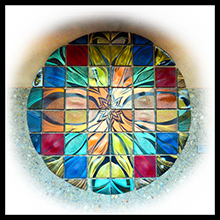About DSPS
(Written steps below)
(NOTE: As of January 2025, DSPS has moved to building 100 where the WRAC Center used to be)
- Step 1: Apply online to Chabot College.
- Complete the Chabot College online application via CCCApply.
- For assistance with the application, students can:
- Come to Bldg 100 (DSPS: ACE), to work with a student assistant
- Go to Student Online Services (Bldg 700)
- Or for assistance in Spanish, go to El Centro (Bldg 700 South).
- For assistance with the application, students can:
- The student should receive their Student ID # (W number) by email 24 to 48 hours after submitting the online application.
- Complete the Chabot College online application via CCCApply.
- Step 2: Complete the DSPS Student Intake form in our online system, Accommodate.
- If you do not have your disability verification (such as an IEP, 504 plan, or doctor's
letter on their letterhead) on hand when completing the intake, it can be submitted
later via email to cc-dsps@chabotcollege.edu (using your student Zonemail account for remote ID verification).
- A hard copy can also be given directly to DSPS staff in Bldg 100, and we can scan it for you.
- If you do not have your disability verification (such as an IEP, 504 plan, or doctor's
letter on their letterhead) on hand when completing the intake, it can be submitted
later via email to cc-dsps@chabotcollege.edu (using your student Zonemail account for remote ID verification).
- Step 3: Once both the intkae and the disability verificationa re received, then we can schedule
an appointment with a DSPS counselor. It can be: 1) In-Person, 2) Online (via Zoom),
or 3) by Phone.
- To set up this appointment, students can either:
- Call the front desk at 510-723-6725
- or Come in-person to DSPS: ACE in Building 100 and make the appointment at the front desk.
- PLEASE NOTE: If accommodations will be needed for the appointment, such as ASL services, please let DSPS staff know when making the appointment.
- To set up this appointment, students can either:
- Step 4: Complete the remaining Chabot College New Student Requirements
- In addition to step 1 above, applying to Chabot, new students need to:
- 2) Complete the FAFSA application (FAFSA assistance available)
- 3) Complete the Online Orientation
- 4) Complete the English Informed Course Selection and Math Guided Self Placement worksheetsin MyPortal
- 5) Complete Title IX - Sexual Assault and Violence Prevention Training
- For technical access assistance, please click the Chabot FAQ link: Chabot College Tech Support FAQ
- In addition to step 1 above, applying to Chabot, new students need to:
- Step 5: Attend DSPS Counseling Appointment to Become a DSPS student.
- Students work with their DSPS counselor to:
- Discuss appropriate college-level accommodations (which are different than those received in high school)
- Create an SEP (Student Education Plan, like a map of what classes to take when to reach your goal)
- Register for classes. This can also be done on ones own, or with assistance at the same locations as mentioned above, for college application assistance.
- Students work with their DSPS counselor to:
Steps to see a DSPS Counselor
|
 |
As an example of a documented disability, our students might have physical, communicative, psychological, and/or a learning disability. Our specialized staff is trained to review 504 and IEP plans, as well as medical documentation, which in conjunction with the interactive process are used to determine what the appropriate college-level accommodations are for each individual student. The counseling a student receives will be educational and vocational primarily, but DSPS counselors can also help with limited personal and crisis counseling as well, and then refer students to other campus resources for further assistance. Additionally, we have multiple PSCN (Psychology Counseling) courses which are designed to assist students in their transition to college, as well as help them choose and pursue their educational and vocational paths.
For non-traditional, older, and returning students, who might not have and IEP or 504, or who have never been identified as having a disability, we have half-semester LNSK 116 classes (the first of our Learning Skills classes). This is primarily an assessment class to see if an individual has a learning disability, which is determined through a series of specialized tests.
Coming back to the center, during a student’s initial session with a DSPS counselor, there are a number of steps we try to complete. For a good session, the student will need to have previously provided their disability verification, as well as completed DSPS an intake form. It is also essential that a students has applied to Chabot College and received their student ID number (W number). This intake form will need to be updated each academic year, so each year when you come back to campus in the fall please make sure to drop by and fill out a new intake form.
After seeing a counselor, some potential accommodations include:
- Access to extended testing time in a distraction-reduced environment
- Access to eText and text-to-speech software, to increase retention and understanding
- Access to a shared note taker
- And several other accommodations, all assigned during the interactive process and as appropriate given disability verification documentation
A student might also receive referrals to other resources, both on and off campus. These include EOPS, Umoja, and Puente, other special programs on campus, and CRIL or DOR for off campus resources.

There are many acronyms used around campus, so please see our acronym dictionary for help with understanding the acronyms we use. In short, our department is called DSPS (Disabled Students Programs and Services), the statewide program for all students with disabilities, while ACE - Accessibility Center for Education is the name of our center (formerly the DSRC - or Disabled Student Resource Center).
There are five services in DSPS, the first three of which are in the center itself. These include: specialized counseling, an alternative testing lab, and a high tech computer lab. The other two parts of DSPS not in the center are an adaptive PE program and a Learning Skills program. We also offer CAS, Computer Application System classes, including Adapted Computer Keyboarding and Intro to Microsoft Word among others. These are LNSK 100 and LNSK 101, respectively. We also have a class devoted to just Intro to Assistive Technology, specifically the Kurzweil 3000 application which allows users to scan, read and write. This is taught under our LNSK 102 class.
Each fall, DSPS sponsors Accessibility Awareness Day (formerly Disability Awareness Day), which is an informational fair that draws the surrounding community to a day of special speakers, booths with on and off campus resources, a hosted lunch, and features a demonstration or game that changes each year.
Additionally, there is a student run club housed in the DSPS, the Able-Disabled Club, which exists to support the needs of students, provides social gatherings, and creates campus awareness of the needs of students with disabilities. The AD Club offers the campus a challenge: "Dare To Be Aware!"
Disabled Students Programs and Services of Chabot College seeks to make its programs and services available to individuals with a physical, communicative, psychological, or learning disability. Disabled Students Programs and Services provides opportunities for individuals to achieve through education a richer and more effective life. Our goal is to encourage students with a disability to become independent and assertive participants in their own educational process. Accessibility in classes, facilities, extracurricular activities and in all student support services is our ultimate objective. We believe citizens with disabilities should have a chance to realize their highest potentials.
To achieve these goals, our stated Student Area Outcomes (SAO) are:
- Ensure excellent and equitable student access to accommodation services
- Promote student awareness about accommodation services through outreach
- Provide recurring opportunities for faculty to Increase their awareness and understanding of accommodations and processes
The Learning Skills (LNSK) program provides Educational Assistance classes (EACs) to assist students that are not yet ready for transfer level classes. The LNSK classes include 1) Computer classes, 2) a Learning Disability (LD) diagnostic class, 3) Math classes, 4) English classes, and 5) academic strategy classes.
Learning Skills Home Page |
Explanation of LD testing |
The Chabot Adapted PE programsd provides customized excercise routines to help individuals stay active, moving, and healthy. This is done with the assistance of a coach trained in adaptive excercise, on equipment specially designed with mobility challenges in mind.
Site tour |
